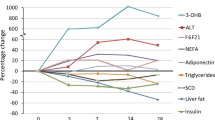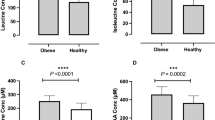Abstract
Background:
Several human and rodent studies suggest that in addition to the amount of energy consumed, timing of food intake contributes to body weight regulation. Consuming most energy in the morning has favorable effects on weight loss and weight maintenance. Whether this also affects glucose metabolism and liver fat independently from weight loss is unknown.
Objective:
We hypothesized that during weight loss, consuming most energy in the morning improves insulin sensitivity and reduces hepatic fat content more than consuming most energy in the evening.
Methods:
Twenty-three obese insulin resistant men (age 59.9±7.9 years, body mass index 34.4±3.8 kg m−2) followed a 4-week hypocaloric diet intervention with either 50% of daily energy consumed in the morning (BF group) or evening (D group). Insulin sensitivity, measured with a two-step hyperinsulinemic euglycemic clamp using a glucose tracer, intrahepatic triglycerides (IHTG), measured using magnetic resonance spectroscopy, and resting energy expenditure (REE) were assessed before and after the diet intervention.
Results:
Meal macronutrient composition and weight loss (6.5±1.5% vs 6.2±1.9%, respectively, P=0.70) did not differ between the BF and D groups. Endogenous glucose production (P⩽0.001), hepatic and peripheral insulin sensitivity (P=0.002; P=0.001, respectively) as well as IHTG content (P⩽0.001) all significantly improved with weight loss, but were not different between the BF and D groups. In addition, both groups decreased REE and respiratory quotient equally.
Conclusions:
During weight loss, consuming most energy in the morning instead of the evening does not have additional beneficial effects on insulin sensitivity and IHTG content. These results do not support weight independent effects of meal timing on glucose metabolism and IHTG in hypocaloric conditions in obese men.
This is a preview of subscription content, access via your institution
Access options
Subscribe to this journal
Receive 12 print issues and online access
$259.00 per year
only $21.58 per issue
Buy this article
- Purchase on Springer Link
- Instant access to full article PDF
Prices may be subject to local taxes which are calculated during checkout



Similar content being viewed by others
References
Flegal KM, Carroll MD, Ogden CL, Johnson CL . Prevalence and trends in obesity among US adults, 1999-2000. JAMA 2002; 288: 1723–1727.
Schmidt M, Johannesdottir SA, Lemeshow S, Lash TL, Ulrichsen SP, Botker HE et al. Obesity in young men, and individual and combined risks of type 2 diabetes, cardiovascular morbidity and death before 55 years of age: a Danish 33-year follow-up study. BMJ Open 2013; 3: e002698.
Ruhl CE, Everhart JE . Determinants of the association of overweight with elevated serum alanine aminotransferase activity in the United States. Gastroenterology 2003; 124: 71–79.
Garaulet M, Gomez-Abellan P . Timing of food intake and obesity: a novel association. Physiol Behav 2014; 134: 44–50.
Viljanen AP, Iozzo P, Borra R, Kankaanpaa M, Karmi A, Lautamaki R et al. Effect of weight loss on liver free fatty acid uptake and hepatic insulin resistance. J Clin Endocrinol Metab 2009; 94: 50–55.
Niskanen L, Uusitupa M, Sarlund H, Siitonen O, Paljarvi L, Laakso M . The effects of weight loss on insulin sensitivity, skeletal muscle composition and capillary density in obese non-diabetic subjects. Int J Obes Relat Metab Disord 1996; 20: 154–160.
Wing RR, Phelan S . Long-term weight loss maintenance. Am J Clin Nutr 2005; 82: 222 S–225.
Koopman KE, Caan MW, Nederveen AJ, Pels A, Ackermans MT, Fliers E et al. Hypercaloric diets with increased meal frequency, but not meal size, increase intrahepatic triglycerides: a randomized controlled trial. Hepatology 2014; 60: 545–553.
Baron KG, Reid KJ, Kern AS, Zee PC . Role of sleep timing in caloric intake and BMI. Obesity (Silver Spring) 2011; 19: 1374–1381.
Wang JB, Patterson RE, Ang A, Emond JA, Shetty N, Arab L . Timing of energy intake during the day is associated with the risk of obesity in adults. J Hum Nutr Diet 2014; 27 (Suppl 2): 255–262.
Garaulet M, Gomez-Abellan P, Alburquerque-Bejar JJ, Lee YC, Ordovas JM, Scheer FA . Timing of food intake predicts weight loss effectiveness. Int J Obes (Lond) 2013; 37: 604–611.
Jakubowicz D, Barnea M, Wainstein J, Froy O . High caloric intake at breakfast vs. dinner differentially influences weight loss of overweight and obese women. Obesity (Silver Spring) 2013; 21: 2504–2512.
Jakubowicz D, Froy O, Wainstein J, Boaz M . Meal timing and composition influence ghrelin levels, appetite scores and weight loss maintenance in overweight and obese adults. Steroids 2012; 77: 323–331.
Jarrett RJ, Baker IA, Keen H, Oakley NW . Diurnal variation in oral glucose tolerance: blood sugar and plasma insulin levels morning, afternoon, and evening. Br Med J 1972; 1: 199–201.
Lee A, Ader M, Bray GA, Bergman RN . Diurnal variation in glucose tolerance. Cyclic suppression of insulin action and insulin secretion in normal-weight, but not obese, subjects. Diabetes 1992; 41: 750–759.
Gibson T, Jarrett RJ . Diurnal variation in insulin sensitivity. Lancet 1972; 2: 947–948.
Morgan LM, Aspostolakou F, Wright J, Gama R . Diurnal variations in peripheral insulin resistance and plasma non-esterified fatty acid concentrations: a possible link? Ann Clin Biochem 1999; 36 (Pt 4): 447–450.
Farshchi HR, Taylor MA, Macdonald IA . Deleterious effects of omitting breakfast on insulin sensitivity and fasting lipid profiles in healthy lean women. Am J Clin Nutr 2005; 81: 388–396.
Romon M, Edme JL, Boulenguez C, Lescroart JL, Frimat P . Circadian variation of diet-induced thermogenesis. Am J Clin Nutr 1993; 57: 476–480.
Morris CJ, Garcia JI, Myers S, Yang JN, Trienekens N, Scheer FA . The human circadian system has a dominating role in causing the morning/evening difference in diet-induced thermogenesis. Obesity (Silver Spring) 2015; 23: 2053–2058.
Sensi S, Capani F . Chronobiological aspects of weight loss in obesity: effects of different meal timing regimens. Chronobiol Int 1987; 4: 251–261.
ter Horst KW, Gilijamse PW, Koopman KE, de Weijer BA, Brands M, Kootte RS et al. Insulin resistance in obesity can be reliably identified from fasting plasma insulin. Int J Obes (Lond) 2015; 39: 1703–1709.
Roenneberg T, Wirz-Justice A, Merrow M . Life between clocks: daily temporal patterns of human chronotypes. J Biol Rhythms 2003; 18: 80–90.
James WPT, Schofield EC . Human Energy Requirements: A Manual for Planners and Nutritionists. Food and Agriculture Organization of the United Nations/Oxford University Press: New York, 1990.
Frayn KN . Calculation of substrate oxidation rates in vivo from gaseous exchange. J Appl Physiol Respir Environ Exerc Physiol 1983; 55: 628–634.
Weir JB . New methods for calculating metabolic rate with special reference to protein metabolism. J Physiol 1949; 109: 1–9.
van Werven JR, Hoogduin JM, Nederveen AJ, van Vliet AA, Wajs E, Vandenberk P et al. Reproducibility of 3.0 Tesla magnetic resonance spectroscopy for measuring hepatic fat content. J Magn Reson Imaging 2009; 30: 444–448.
de Weijer BA, Aarts E, Janssen IM, Berends FJ, van de Laar A, Kaasjager K et al. Hepatic and peripheral insulin sensitivity do not improve 2 weeks after bariatric surgery. Obesity (Silver Spring) 2013; 21: 1143–1147.
Ackermans MT, Pereira Arias AM, Bisschop PH, Endert E, Sauerwein HP, Romijn JA . The quantification of gluconeogenesis in healthy men by (2)H2O and [2-(13)C]glycerol yields different results: rates of gluconeogenesis in healthy men measured with (2)H2O are higher than those measured with [2-(13)C]glycerol. J Clin Endocrinol Metab 2001; 86: 2220–2226.
Finegood DT, Bergman RN, Vranic M . Estimation of endogenous glucose production during hyperinsulinemic-euglycemic glucose clamps. Comparison of unlabeled and labeled exogenous glucose infusates. Diabetes 1987; 36: 914–924.
Steele R . Influences of glucose loading and of injected insulin on hepatic glucose output. Ann NY Acad Sci 1959; 82: 420–430.
Chaix A, Zarrinpar A, Miu P, Panda S . Time-restricted feeding is a preventative and therapeutic intervention against diverse nutritional challenges. Cell Metab 2014; 20: 991–1005.
Sherman H, Genzer Y, Cohen R, Chapnik N, Madar Z, Froy O . Timed high-fat diet resets circadian metabolism and prevents obesity. FASEB J 2012; 26: 3493–3502.
Bandin C, Scheer FA, Luque AJ, Avila-Gandia V, Zamora S, Madrid JA et al. Meal timing affects glucose tolerance, substrate oxidation and circadian-related variables: a randomized, crossover trial. Int J Obes (Lond) 2015; 39: 828–833.
Jakubowicz D, Barnea M, Wainstein J, Froy O . Effects of caloric intake timing on insulin resistance and hyperandrogenism in lean women with polycystic ovary syndrome. Clin Sci (Lond) 2013; 125: 423–432.
Peplonska B, Bukowska A, Sobala W . Association of rotating night shift work with BMI and abdominal obesity among nurses and midwives. PLoS One 2015; 10: e0133761.
Leibel RL, Rosenbaum M, Hirsch J . Changes in energy expenditure resulting from altered body weight. N Engl J Med 1995; 332: 621–628.
Rosenbaum M, Hirsch J, Gallagher DA, Leibel RL . Long-term persistence of adaptive thermogenesis in subjects who have maintained a reduced body weight. Am J Clin Nutr 2008; 88: 906–912.
Sumithran P, Proietto J . The defence of body weight: a physiological basis for weight regain after weight loss. Clin Sci (Lond) 2013; 124: 231–241.
Keim NL, Van Loan MD, Horn WF, Barbieri TF, Mayclin PL . Weight loss is greater with consumption of large morning meals and fat-free mass is preserved with large evening meals in women on a controlled weight reduction regimen. J Nutr 1997; 127: 75–82.
Consoli A, Capani F, Del Ponte A, Guagnano T, Iezzi M, Ditano G et al. [Effect of scheduling of meal times on the circadian rhythm of energy expenditure]. Boll Soc Ital Biol Sper 1981; 57: 2322–2324.
Bradley U, Spence M, Courtney CH, McKinley MC, Ennis CN, McCance DR et al. Low-fat versus low-carbohydrate weight reduction diets effects on weight loss, insulin resistance, and cardiovascular risk: a randomized control trial. Diabetes 2009; 58: 2741–2748.
Kirk E, Reeds DN, Finck BN, Mayurranjan SM, Patterson BW, Klein S . Dietary fat and carbohydrates differentially alter insulin sensitivity during caloric restriction. Gastroenterology 2009; 136: 1552–1560.
Thomas EL, Brynes AE, Hamilton G, Patel N, Spong A, Goldin RD et al. Effect of nutritional counselling on hepatic, muscle and adipose tissue fat content and distribution in non-alcoholic fatty liver disease. World J Gastroenterol 2006; 12: 5813–5819.
Korenblat KM, Fabbrini E, Mohammed BS, Klein S . Liver, muscle, and adipose tissue insulin action is directly related to intrahepatic triglyceride content in obese subjects. Gastroenterology 2008; 134: 1369–1375.
Visser ME, Lammers NM, Nederveen AJ, van der Graaf M, Heerschap A, Ackermans MT et al. Hepatic steatosis does not cause insulin resistance in people with familial hypobetalipoproteinaemia. Diabetologia 2011; 54: 2113–2121.
Acknowledgements
We acknowledge our research assistant Martine van Vessem for help with the clamps. This research was supported by the Dutch Technology Foundation STW (Perspective grant OnTime project 12189), which is part of the Netherlands Organization for Scientific Research (NWO), and which is partly funded by the Ministry of Economic Affairs.
Author contributions
RV, MS and SF designed research; RV conducted the research; RV, AN and MT analyzed the data; RV wrote the paper; and SF and MS had primary responsibility for the final content. All authors read and approved the final manuscript.
Author information
Authors and Affiliations
Corresponding authors
Ethics declarations
Competing interests
MS serves on the advisory board of Fresenius Kabi Netherlands (Zeist, The Netherlands). The remaining authors declare no conflict of interest.
Rights and permissions
About this article
Cite this article
Versteeg, R., Ackermans, M., Nederveen, A. et al. Meal timing effects on insulin sensitivity and intrahepatic triglycerides during weight loss. Int J Obes 42, 156–162 (2018). https://doi.org/10.1038/ijo.2017.199
Received:
Revised:
Accepted:
Published:
Issue Date:
DOI: https://doi.org/10.1038/ijo.2017.199
This article is cited by
-
Eating habits are associated with subjective sleep quality outcomes among university students: findings of a cross-sectional study
Sleep and Breathing (2022)
-
Fetuin-B, a potential link of liver-adipose tissue cross talk during diet-induced weight loss–weight maintenance
Nutrition & Diabetes (2021)
-
Short sleep duration and food intake: an overview and analysis of the influence of the homeostatic and hedonic system
Nutrire (2020)
-
Circadian clocks and insulin resistance
Nature Reviews Endocrinology (2019)



